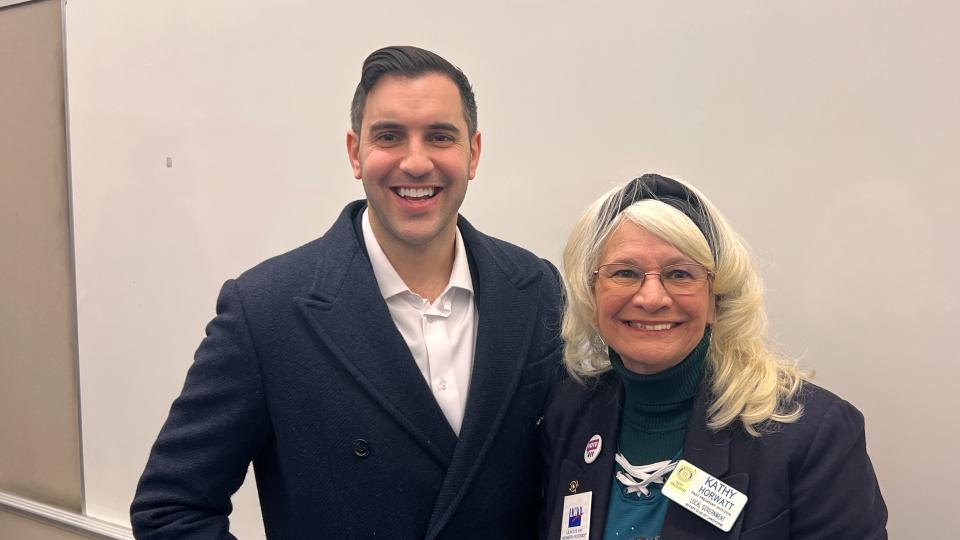Empowering the middle: Bucks politicians, political watchers embrace independents
With partisan bickering at an all-time high, current and former politicians, along with political watchers and the League of Women Voters, said a way to cut through the extremism of both parties is to allow registered independents to vote in primary elections.
Rep. Brian Fitzpatrick, R-01 of Middletown, at a forum in Lower Bucks on Friday called for "structural political reform," while former Congressman James Greenwood raised concern that 1.4 million Pennsylvanians are registered independents and thus not allowed to vote in any of the state primaries.

Pennsylvania is one of nine states that bar independents from voting in primary elections.
Fitzpatrick and Greenwood joined Democratic strategist Danny Ceisler, League of Women's Voters representative Kathy Horwatt and Ballot PA director David Thornburgh at the "Finding the Middle" symposium at The Epstein Campus at Bucks County Community College in Bristol Township.
Bucks County Community College faculty member Bill Pezza moderated.
Related:Greenwood: The right's cynical attacks on pro-infrastructure Republicans
The problem is real, they said, and there's no easy fix. They focused on the power of independent voters.
Registered independents can't vote in primaries in Bucks County
Thornburgh said a breakdown of the more than one million registered independents show that many groups are disenfranchised through the the closed primary process.
"One of the numbers that really grabbed me is that 50% of Pennsylvania veterans considered themselves to be politically independent. So if you're a Pennsylvanian veteran and you served your country and come back home, and you register as an independent, you are barred from voting in primary elections," Thornburgh said. "We could be talking about 400,000 veterans, to whom we are basically saying thanks for your service, but no thanks for your vote.
"To me, that is unconscionable."
More:Fitzpatrick wants to forge 'bipartisan coalition to get things done' in Congress
Further, Thornburgh said 50% of young voters are registered independents, while 33% of the Latino population, whom he said was the fastest growing population group in the state, are registered independents.
"If we are really serious about improving this great Democratic experiment that we have and we want those people to participate," Thornburgh said, "you can't shut them out of the most important elections."
Allowing independents to vote in primaries a way to thwart extremism
Panelists said that allowing independents to vote in primaries could prevent the extreme fringes of either party from winning the election and coasting through to the general election.
"S0 what happens is, the most strident voters, the most dedicated and in many ways the most loyal people are the ones voting in the primaries," Pezza said. "Therefore, candidates are drawn to that section of the party instead of perhaps a more moderate middle of the party.
"So in a Republican district if you want to win, you have to speak to that type of voter, and if you don't, you're going to get primaried."
Roadblocks to independents voting in primaries
Horwatt said one problem is the number of young people that are convinced that becoming a registered independent is a way of showing their political freedom, while in reality, they are disenfranchising themselves from the process.
"We ask them and explain to them if they realize they are losing your franchise, your voice, every time you are not choosing a party," Horwatt said. "They tell us that they don't want to have anything to do with parties."
The panelists agreed change will be slow and incremental, but referendums and ballot questions are not the answer. Crossover primaries — in which Democrats can vote for Republicans and vice versa — aren't the answer either.
The only viable option is for the current state legislature to craft an independent voting rights bill, and for it to be voted on and adopted.
Meanwhile, FItzpatrick said the federal government has very limited jurisdiction when it comes to the way states run their elections, but said he was open to using "the power of the purse" to incentivize or tie certain federal funding streams to states that enact certain electoral reforms.
"But the cleaner way to do it is through legislation," he said.
This article originally appeared on Bucks County Courier Times: Empowering the middle: Bucks politicians, political watchers embrace independents

